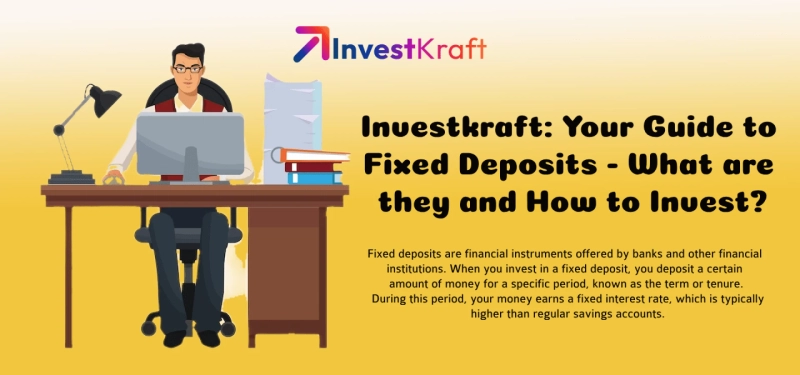Fixed deposits, also known as term deposits, are a popular financial instrument that offers a secure and reliable way to grow your savings. As an investor seeking stable returns, understanding fixed deposits and how to invest in them is essential. In this blog post, we will provide you with a comprehensive guide to fixed deposits, explaining what they are and guiding you through the process of investing in them.
Introduction to Fixed Deposits
Fixed deposits are financial instruments offered by banks and other financial institutions. When you invest in a fixed deposit, you deposit a certain amount of money for a specific period, known as the term or tenure. During this period, your money earns a fixed interest rate, which is typically higher than regular savings accounts.
Features and Benefits of Fixed Deposits
Fixed deposits offer several features and benefits, making them an attractive investment option for many individuals:
Guaranteed Returns: Fixed deposits provide assured returns, as the interest rate is fixed at the time of investment.Safety: Fixed deposits are considered safe investments as they are backed by the bank or financial institution's reputation and regulations.Flexible Tenure: You can choose the tenure of your fixed deposit according to your financial goals and requirements, ranging from a few months to several years.Regular Income: You can opt for periodic interest payouts, providing you with a steady income stream.Loan against Fixed Deposit: In times of financial emergencies, you can avail of loans against your fixed deposit, offering liquidity without breaking the deposit.Understanding the Working of Fixed Deposits
When you invest in a fixed deposit, you agree to lock in your money for a specific period. The bank or financial institution pays you a predetermined interest rate on the principal amount throughout the tenure. At the end of the tenure, you receive the principal amount along with the interest earned.
Factors to Consider Before Investing in Fixed Deposits
Before investing in fixed deposits, consider the following factors:
Interest Rates: Compare the interest rates offered by different banks or financial institutions. Higher interest rates can significantly impact your returns.Tenure: Choose a tenure that aligns with your financial goals. Longer tenures generally offer higher interest rates.Penalty for Premature Withdrawal: Understand the penalties or charges associated with early withdrawal of funds from your fixed deposit.Deposit Insurance: Ensure that the bank or financial institution you choose is covered by deposit insurance schemes to safeguard your investment.Steps to Open a Fixed Deposit Account
To open a fixed deposit account, follow these steps:
Research and choose a bank or financial institution that suits your needs.Visit the branch or their website to fill out the fixed deposit application form.Provide the necessary documents, such as identity proof, address proof, and PAN card.Decide on the deposit amount and tenure.Submit the application and deposit the funds.Receive the fixed deposit receipt or confirmation.Managing Your Fixed Deposit Account
Once your fixed deposit account is active, it is crucial to monitor and manage it effectively:
Track the maturity date of your fixed deposit.Plan for reinvestment or withdrawal upon maturity.Update contact details with the bank or financial institution.Keep track of interest payments and TDS deductions, if applicable.Tax Implications of Fixed Deposits
Interest earned from fixed deposits is subject to tax. The interest income is added to your total taxable income and taxed as per the applicable tax slab. Banks deduct TDS (Tax Deducted at Source) on the interest income if it exceeds a certain threshold.
Evaluating Fixed Deposits vs. Other Investment Options
While fixed deposits offer stability and safety, it is essential to compare them with other investment options based on your financial goals, risk appetite, and expected returns. Consider factors such as inflation, liquidity requirements, and diversification.
Tips for Maximizing Returns from Fixed Deposits
To maximize returns from fixed deposits, consider the following tips:
Compare interest rates and choose the best available option.Opt for cumulative interest payout to benefit from compounding.Utilize the auto-renewal facility to continue earning returns without hassle.Diversify your investments to balance risk and returns.Conclusion
Fixed deposits are a reliable and secure investment option that offers guaranteed returns. By understanding the features, benefits, working, and considerations of fixed deposits, you can make informed investment decisions to grow your savings. Evaluate your financial goals, compare options, and choose the right fixed deposit that aligns with your needs.
We hope this guide has provided valuable insights into fixed deposits and their investment process. Start exploring fixed deposit options today to secure your financial future.
For more information and personalized assistance, visit Investkraft and get access to a wide range of financial services.


